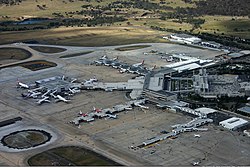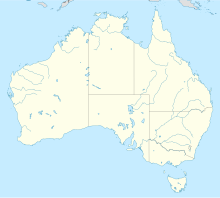Melbourne Tullamarine Airport
| Melbourne Airport | |||||||||||||||
|---|---|---|---|---|---|---|---|---|---|---|---|---|---|---|---|
 |
|||||||||||||||
 |
|||||||||||||||
| Summary | |||||||||||||||
| Airport type | Public | ||||||||||||||
| Owner | Leased Commonwealth Airport | ||||||||||||||
| Operator | Australia Pacific Airports Corporation Limited | ||||||||||||||
| Serves | Melbourne | ||||||||||||||
| Location | Tullamarine, Victoria, Australia | ||||||||||||||
| Hub for | |||||||||||||||
| Elevation AMSL | 434 ft / 132 m | ||||||||||||||
| Coordinates | 37°40′24″S 144°50′36″E / 37.67333°S 144.84333°ECoordinates: 37°40′24″S 144°50′36″E / 37.67333°S 144.84333°E | ||||||||||||||
| Website | melbourneairport |
||||||||||||||
| Map | |||||||||||||||
| Runways | |||||||||||||||
|
|||||||||||||||
| Statistics (2015/2016) | |||||||||||||||
|
|||||||||||||||
|
Sources: Australian AIP and aerodrome chart
Passengers and aircraftmovements from the Bureau of Infrastructure, Transport and Regional Economics |
|||||||||||||||
| Passengers | 33,704,854 |
|---|---|
| Aircraft movements | 234,789 |
| Economic impact (2012) | $6.8 billion |
| Social impact (2012) | 47.4 thousand |
Melbourne Airport (IATA: MEL, ICAO: YMML), colloquially known as Tullamarine Airport, is the primary airport serving the city of Melbourne, and the second busiest airport in Australia. It was opened in 1970 to replace the nearby Essendon Airport. Melbourne Airport is the sole international airport of the four airports serving the Melbourne metropolitan area.
The airport is 23 kilometres (14 miles) from the city centre. The airport has its own postcode—Melbourne Airport, Victoria (postcode 3045). This is adjacent to the suburb of Tullamarine.
The Melbourne–Sydney air route is the fourth most-travelled passenger air route in the world. The airport features direct flights to 33 domestic destinations and to destinations in the Pacific, Europe, Asia and North America. Melbourne Airport is the number one arrival/departure point for the airports of four of Australia's seven other capital cities. Melbourne serves as a major hub for Qantas and Virgin Australia, while Jetstar Airways and Tiger Airways Australia utilise the airport as home base. A regular coach service provides public transport to and from the city. Melbourne is the busiest airport for international export freight as of August 2011, while second busiest for import freight. Domestically, Melbourne serves as headquarters for Australian air Express and Toll Priority and handles more domestic freight than any other airport in the nation.
...
Wikipedia



